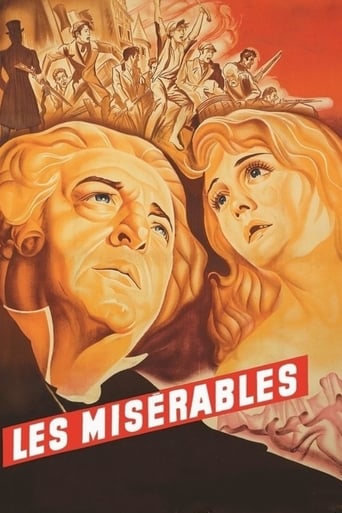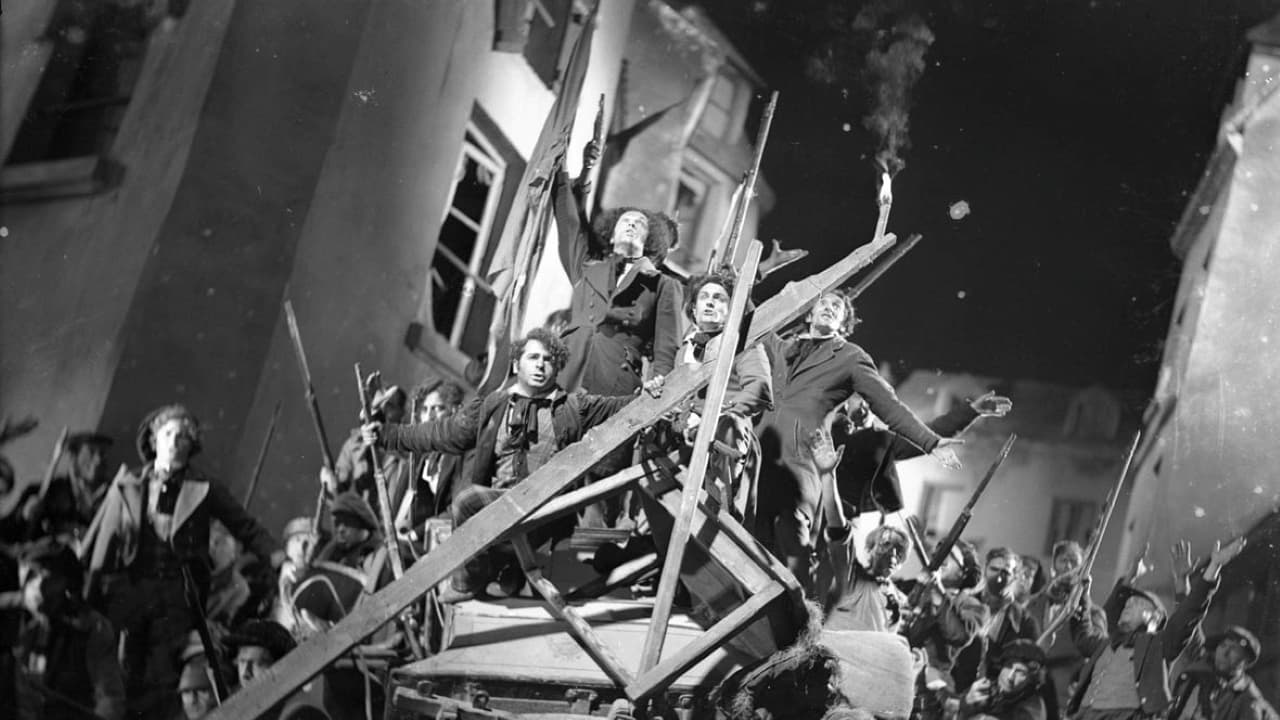runamokprods
The first part of this three part, four hour and 21 minute adaptation is superb and moving. For its time the characters are surprisingly nuanced in both writing and acting, and there are a number a great scenes and terrific twists. Frustratingly the 2nd and 3rd parts feel much more hackneyed and clichéd, with more uneven acting, thinner characters, and overly melodramatic moments.Lead actor Harry Baur is great throughout, which helps keep the 2nd and 3rd parts still quite watchable, and throughout there is some terrific camera-work, including modern-feeling touches like hand-held fights, and Dutch angled scenes. Certainly this is a brave work on a film-making level. But as the story focuses less and less on Jean Valjean and his various incarnations, and more and more on the world around him, that thrilling feeling of watching a masterpiece fades into just watching a very interesting and impressive piece of film history. That said, many film writers I respect treat the whole thing as a masterwork, so perhaps I'll re-visit.
MartinHafer
I have seen five different versions of this Victor Hugo film, read the book and even seen the play--so it's obvious that I love the story and have different insights than the typical viewer. Clearly of the films I have seen this is the best version for many reasons. The biggest reason is that at almost five hours, it comes closest to Hugo's vision, as "Les Misérables" is a huge and complex story--and most films skip major portions of the book in order to squeeze it into a normal format. However, with this version, the film was broken into three distinct full-length segments and most of the important elements of the film are present (even if they did change the ending and a few other portions of the story). The second reason is that although it is a black & white film, it is the most artistic of the bunch--with some of the best cinematography of any film of the era. The way the shots are framed is brilliant--beautiful, unique and lovingly recreated. It was directed and filmed by masters. Third, I liked the guy who played the lead character, Jean Valjean. Unlike the 'pretty boys' who often play this man (such as Richard Jordan, Frederic March or Liam Neeson), Hary Baur was the hulking man the character was in the book--Neeson and the rest simply didn't have the physical look of Valjean and Baur had a nice, restrained performance.So why if it all looks so great do I only give the film a 9--after all, it is a wonderful film. The fact is that I rarely give 10s. To me a 10 must mean something--that a film is essentially perfect. This is a great film, but not perfect. Although a tiny quibble, Fantine was supposed to be missing her teeth but here it's obvious they were blacked out instead. Now I am NOT suggesting they should have knocked out her teeth, but they could have been more careful in the filming (which was otherwise perfect) to make sure it wasn't obvious they were blackened. And finally, my biggest complaint was about the relentless Inspector Javert. To me, he was THE most important and complex character in the story. Here, however, he's more of a minor annoyance and the depth of his presence was minimized. Plus, while his suicide could have been interpreted the way the film suggested, I always felt Javert killed himself not because of his failure at his job (as the film states) but because of his realization that his entire legalistic life was for nothing. Still, the movie is amazing and I suggest you see it and read the book--it's one of the best stories I've read and one that has many deep philosophical questions--questions that just aren't always present in the films.
pitsburghfuzz
So far, I have not read the book, and have only listened to a few bits from the musical, and I am usually not too fond of foreign films. I saw that this was on TCM not too long ago and I decided to give a watch. It took me two days, because I was doing other things, and here is my overall impression: One of the Best Films Ever! The story is about convict, Jean Valjean(played by Harry Baur, who gives an incredible performance), has a changed experience because of a bishop who took him in(Henry Krauss), and saved him from going into forced labor for life. Valjean uses silver the bishop gives him, so he could have a new start in life. Along the way, Inspector Javert(Charles Vanel) tracks him down throughout the years, and while Valjean escapes and changes his identity. The story's main themes in my opinion, are redemption, humanity, and the revaluation of good and evil. Valjean is an escaped convict, but he shows love and compassion for his fellow man, and even takes in a dying woman's child as his own. He even offers Javert to arrest him after he has found Cosette(the dying woman, Fantine's child). While Javert, a police inspector, is at the wrong side of ethics, as he lacks the compassion Valjean has. The film runs over four hours, the longest film I have ever seen, and its worth it. You need the running time to be long so you can discover the full depth of the story. The film also contains themes of revolution which are present, but it does not begin until much later on in the film. Overall, one of my 10 favorite films, and is one you should get your hands on.
Benoît A. Racine (benoit-3)
TFO (la Télévision Française en Ontario), the French Ontario TV channel has started showing the complete version of this 5 hours and 15 minutes piece (3 x 1 hour and 47 minutes) in three parts, on three consecutive Sundays, starting yesterday. This is a major event as this film is almost never shown, is not available on DVD and is usually cut down, when shown at all, to three hours. It is an amazing accomplishment for 1934 because of the following elements: the mobility of the camera, the sound effects, the music by Arthur Honegger, the witty, almost literary, visual ellipses, the interpretation of Baur and Vanel, the editing and eerie expressionistic camera angles, and the production values in general (sets and costumes cannot be topped). The only drawback of the TV showing is that the film is cropped vertically (the old "tops of the heads are missing" syndrome), which comes from cropping a 1.30:1 narrow ratio early-talkie film onto a 1.37:1 TV screen without pillar-boxing. It's still worth the watch. Needless to say: This is long overdue on DVD!Historical note: The creepy night scene where Cosette is sent, despite her fears, to fetch water a long way from home at the request of her heartless keepers, is a direct inspiration for Walt Disney's Snow White's panicky flight through the forest scene of three years later (1937).May 2008 update: As most of you probably know, the whole film is now available on DVD from Criterion's Eclipse series in Region 1.


 AD
AD

